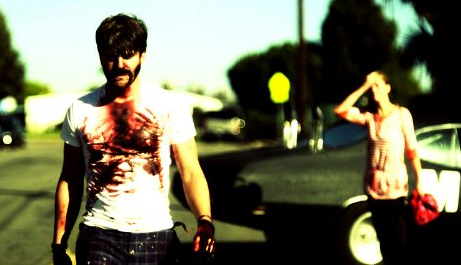Review: Bellflower

While twentysomething angst is a common theme in indie films, the gritty and violent Bellflower is a unique take on the trials of young adulthood. A flawed but intriguing movie about the post-apocalyptic fantasies of disaffected young men, Bellflower is strong on concept, vision and visuals, if less so in its story and acting.
Writer/director Evan Glodell stars as Woodrow, an aimless Southern California twentysomething who spends his copious amounts of free time fantasizing about vague notions of global destruction. He and his equally aimless buddy Aiden (Tyler Dawson) build a crude but effective arsenal of flamethrowers and other weapons, hoping that post-apocalyptic chaos will allow their would-be gang, Mother Medusa, to rule the day in a spree of incendiary violence.
Waiting for worldwide mayhem, of course, means a lot of waiting. In the meantime, Woodrow meets and falls hard for free-spirited Milly (Jessie Wiseman); in one of many unlikely Bellflower elements, their first date consists of a drunken road trip to Texas in a customized Volvo with a liquor tap on the dashboard. The couple's ensuing relationship is predictably rocky, causing emotional mayhem far more devastating than any of Woodrow's destructive fantasies.
What follows is something of a cross between Max Max and a typical dating-is-hell indie film. Intertwined with loudly low-rent pyrotechnics are the usual hook-up-and-break-up scenarios, soft-focus moments of romantic ecstasy and searing moments of betrayal and despair. There also is a memorably badass road-warrior muscle car named Medusa, a vehicle that, in effect, is a minor character. (Medusa is so badass that I'm thinking of installing vertical tailpipes and flame throwers on my Prius.)
For all its predictable romance, however, Bellflower follows an unexpected path in its third act. I'll skip the details to avoid spoilers; I'll just say that Woodrow and Aiden's generally harmless macho posturing turns disturbingly dark, murderous and misogynistic.
To Glodell's credit, Bellflower is thematically dead on. In its best moments, it nails the mindless and misguided machismo that dictates behavior in far too many young men. Bellflower also makes it blindingly clear that this machismo is rooted in feelings of powerlessness and emasculation. Woodrow and Aiden are of the age when the grinding competition for jobs, romantic partners and finding a meaningful purpose in life can lead to endless frustration. It's obvious that the two friends, their self esteem beaten down daily, are completely unsure of themselves and unhappy with their lives.
Bellflower also is visually striking, with an inventively grungy look to match its grungy story of men behaving badly. Glodell and his crew built all the hardware (including Medusa) themselves, showing great skill at creating believable props on a typically indie shoestring budget. Glodell even designed his own optical system, which is used to great, grimy effect in many scenes. Contrasting all the grime are unexpectedly saturated colors; this juxtaposition is interesting, although I found the bright colors a bit overdone at times.
If only the script, characterization and acting were on par with the striking look and feel, Bellflower would have the makings of a memorable statement about misspent youth. But the film suffers greatly from an often jarring blend of fantasy and reality that doesn't quite work. I understand the disorienting, surreal effect Bellflower is going for, but the nonlinear structure and transitions between real and imagined scenes are more confusing than effective. Some story elements simply aren't believable, and it's a stretch to believe that certain events (such as the radical transformation of an old muscle car into the highly customized Medusa) can occur as quickly as they do.
Another fundamental problem with Bellflower is that it lacks even one likable character. Woodrow and Aiden come across as the kind of guys you'd never invite to your party. Mostly self-absorbed, slightly whiny and generally unpleasant, they're so unsympathetic that it's hard to care when they suffer serious emotional and physical injuries. Milly is just as self-centered and no more likeable; at times I almost wanted her to suffer. While this narcissistic ensemble may be part of Bellflower's commentary about the self-absorption of young adulthood, Woodrow, Aiden and their friends are so annoying they make the film difficult to like. At times, Bellflower seems as self-indulgent as its characters.
Compounding the characters' negativity is the uneven and often wooden acting. The performances are at their best and most convincing during the film's quieter moments, when we see faint and fleeting glimpses of Bellflower's humanity. But when a scene calls for rage and passion, the emotions seem forced and not quite sincere. The script may be partly to blame. Because it doesn't make us care much about the characters -- or adequately explain why they give a damn about anything, especially each other -- their outbursts and other emotional reactions often seem unjustified and unbelievable.
Despite these strong criticisms, I do respect Bellflower's strong points and believe Glodell is a filmmaker with much potential. Bellflower is worth a look for its unique visuals and themes, and viewers who can overlook its bouts of self-indulgence and unrelenting dourness may enjoy it more than I did.

